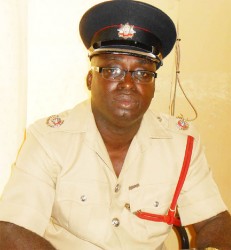Officer-in-Charge of Operations at the Guyana Fire Service (GFS) Compton Sparman, yesterday testified that given the security risks that exist within the prison system, the fire service had to wait on the directive of prison authorities to proceed on rescue efforts on the morning of March 3, when the lives of 17 inmates were lost.
This was the evidence he gave under examination by Counsel Eusi Anderson, who is representing the Guyana Fire Service and the Guyana Defence Force, when the Commission of Inquiry (CoI) into the tragedy continued.
Anderson had asked the officer what prevented the firemen from accessing the doors to the Capital A Division, where the inmates had perished.

Sparman said that given the environment they were in, they had to wait on instructions from the prison officials on how to proceed with the rescue, given that they could not just run into the prison like any other environment.
He stated that by the time he had arrived at the prison on the morning of March 3, the fire had already been blazing in the Capital A Division and he knew right away that the situation was a serious one. His firemen, he said, had already set up hoses and had begun to tend to the flames. Sparman told the tribunal that he had received the call of the emergency at 11.25 am, but could not comment on the response time of the firefighters. He said that it may have taken him five to ten minutes to arrive there and that his arrival had been not long after the first responders.
He recalled that the scene at the time had been chaotic, with banging on the door to the Capital A and screams coming from not only inside the division but the surrounding dorms in the compound.
Being the senior fire official there at the time, he said he approached Deputy Director Gladwin Samuels, who had been in charge, and enquired whether there was any system in place to evacuate the division. He said he was told by Samuels that the inmates did not want to come out and that they had refused. He related that it was his understanding that prisoners had been removed from the Capital A Division through Capital B. To his knowledge, he said, there were initially 60 plus individuals in the dorm.
Like the inmates who had previously testified, Sparman recalled seeing prison officers attempt to open the door to the Capital block using a key and a cutter. He said, however, that the men would have experienced difficulty using either tool to open the door as the heat would have caused the metal to expand.
In terms of the efforts made by the firefighting officials, Sparman explained that on the night of March 2, after several small fires were extinguished at the Capital A division, two fire engines were left on standby once the threat had been reduced. Those engines were, however, withdrawn at 8 am on March 3, when it was assessed that a threat no longer existed.
Contrary to a testimony made by a prison witness, Sparman said that at no point did the fire service run out of water and that the water there, approximately 27,000 litres in capacity, was adequate for the magnitude of the fire. The only time water would have been cut, he said, would have been as a firefighting strategy, when they may have repositioned the hoses.
Although no assessments were made of the fires lit on March 2, he testified that the fire pattern following the March 3, blaze showed that fires had been lit at three different sections of the room: near the front, near the back and at the middle close to Capital B. He could not state whether any of the markings were from the fires on the first day.
He testified that the entire ceiling had been scorched and suggested that mattresses, which were what had been burning, had released gases into the air, which caused the fire to move violently, devouring everything in its path.
Sparman, who was the first witness to appear in representation of the Joint Services and was subject to cross-examination by lawyers Melville Duke and Dexter Todd, will make another appearance today for further cross-examination by attorney Christopher Ram. An additional witness is also expected to testify.




